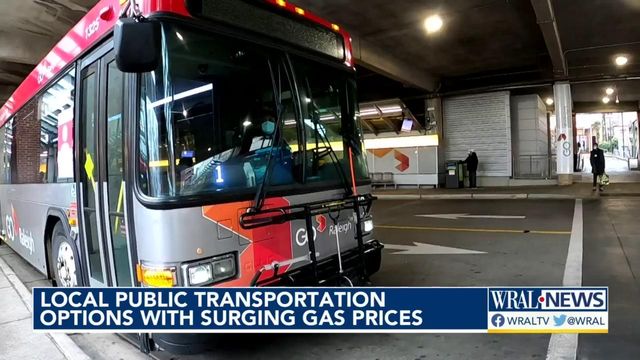Average gas price in Raleigh reaches $4.19. Why not ride the bus instead?
GoCary, GoDurham, GoRaleigh and GoTriangle have suspended bus fares through June 30, 2022.
Posted — UpdatedBetween Wednesday and Thursday, average prices jumped by 5 cents. On Thursday, the average price of a gallon of gas in North Carolina stands at $4.18.
History shows people use public transportation more frequently when gas prices go up.
Realizing many people have probably never taken a public bus in Raleigh, WRAL News took a ride on Tuesday from downtown Raleigh to North Hills to show viewers how it works. It took about 27 minutes.
“(Often times,) they’re not familiar with the bus, or they’re scared to ride,” said GoRaleigh transportation supervisor David Walker. “It’s actually a very easy process.”
Normally, bus fares cost $1.25 per ride.
GoRaleigh is regional and includes routes to Garner, Knightdale, Rolesville, Wake Forest, Wendell and Zubulon. The service has 37 routes, and there are 87 buses on the roads during peak times. Service starts at 4:30 a.m.
Walker said GoRaleigh is up to 73% of its pre-COVID ridership.
By 2023, about 70% of GoRaleigh's fleet of vehicles will be zero or near-zero emissions, according to city of Raleigh senior communications liaison Andrea Epstein. The agency's first five electric buses arrived this year.
Epstein said GoRaleigh has 48 compressed natural gas buses and is adding 28 this fiscal year. The current fleet of compressed natural gas buses saves the city $50,000 per month, according to Epstein.
GoTriangle includes longer routes to Durham, the Research Triangle and Raleigh-Durham International Airport. The service has a database of 13,000 commuters so it can match up with people for carpooling.
“Most people just need to get out and try it,” transit rider Clennis Noble said.
Rider Jake Charlet said he believes there’s a stigma to taking public transportation. He said he hopes the rising gas prices will encourage more people to take public transportation.
“Aside from just gas overall, to have less emissions,” he said. “It’s a far more convenient utility for the public.”
Related Topics
• Credits
Copyright 2024 by Capitol Broadcasting Company. All rights reserved. This material may not be published, broadcast, rewritten or redistributed.






